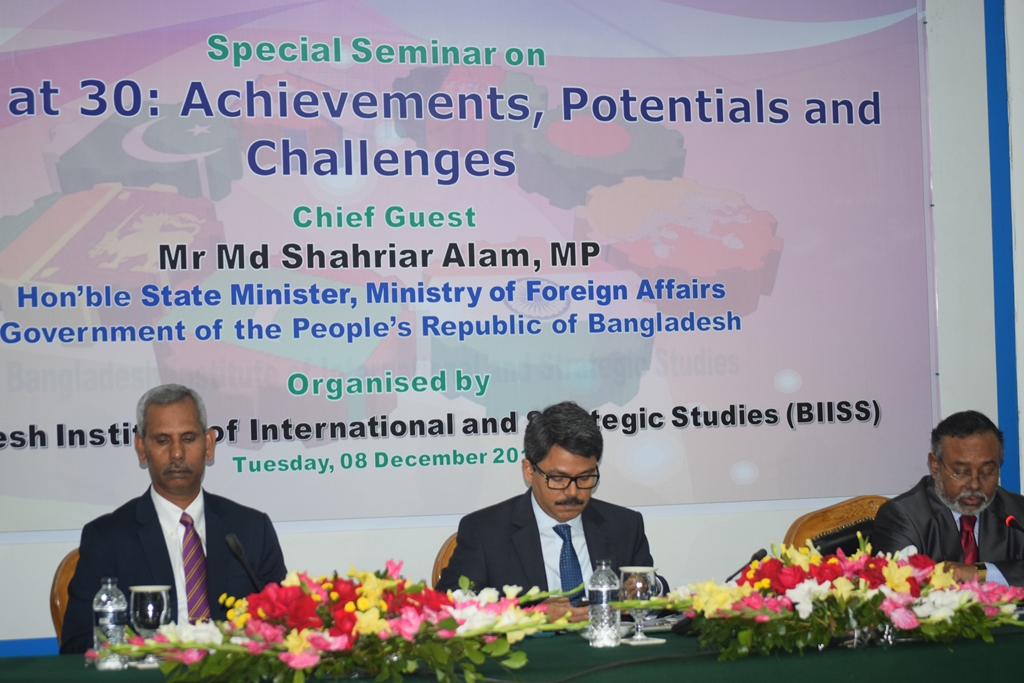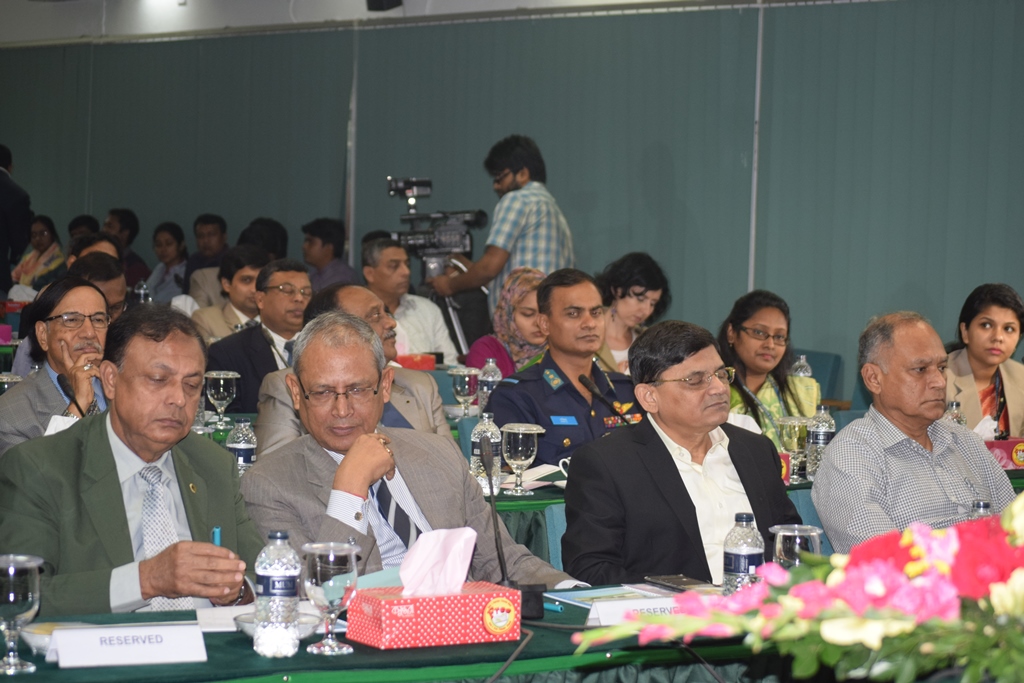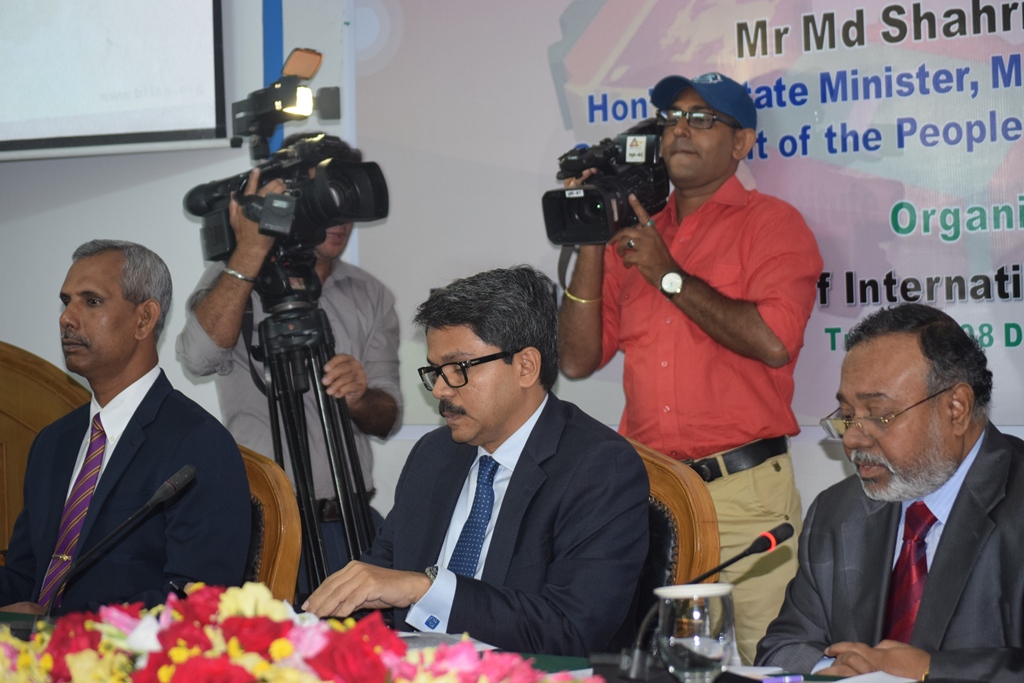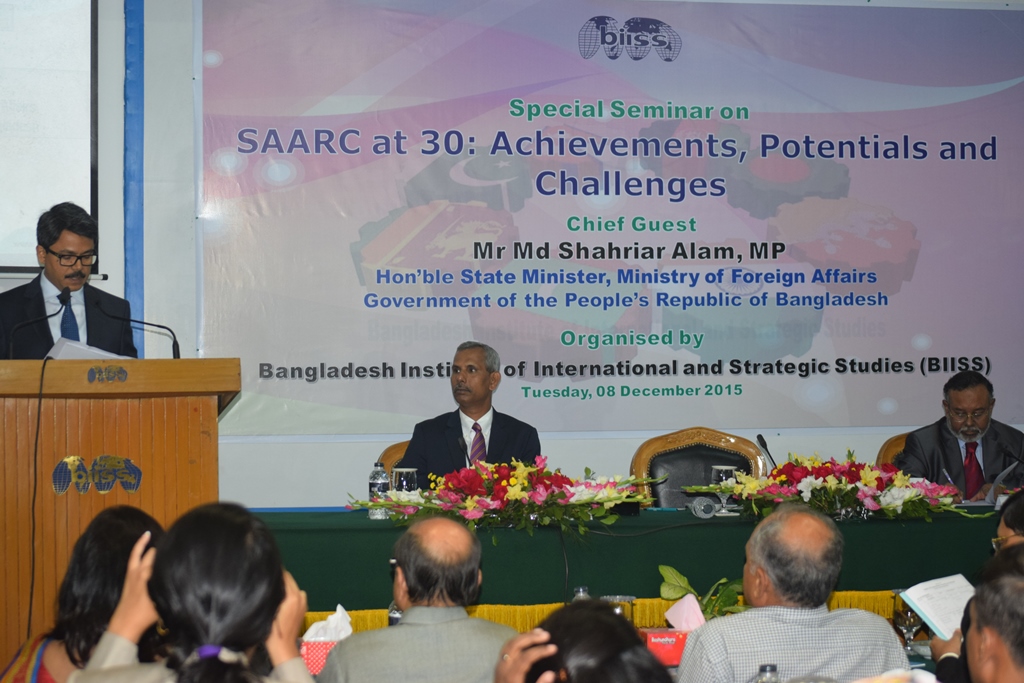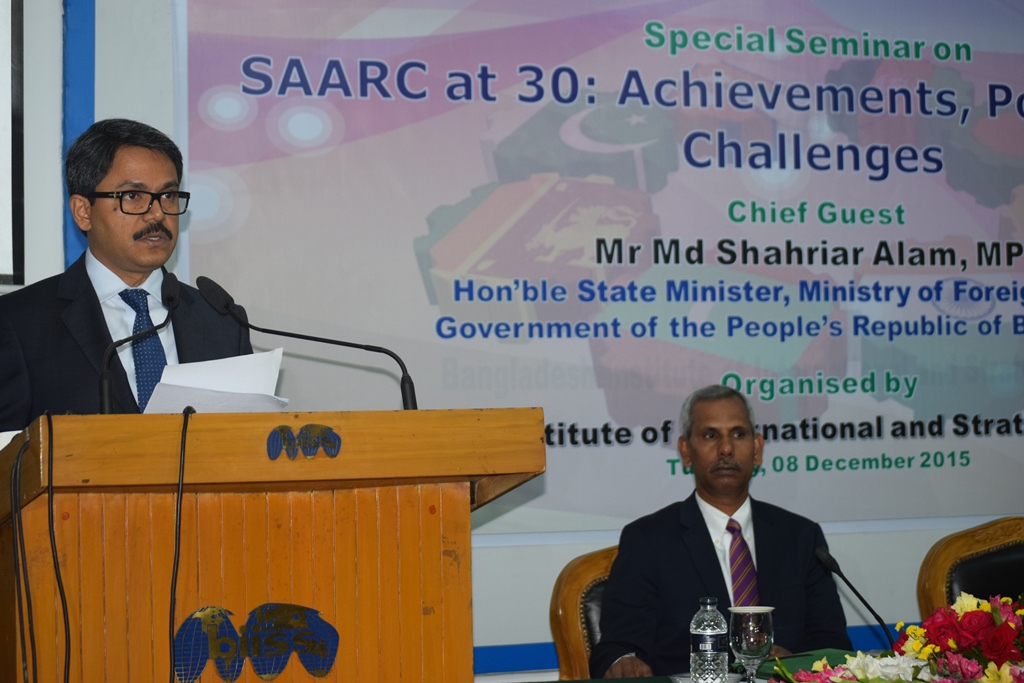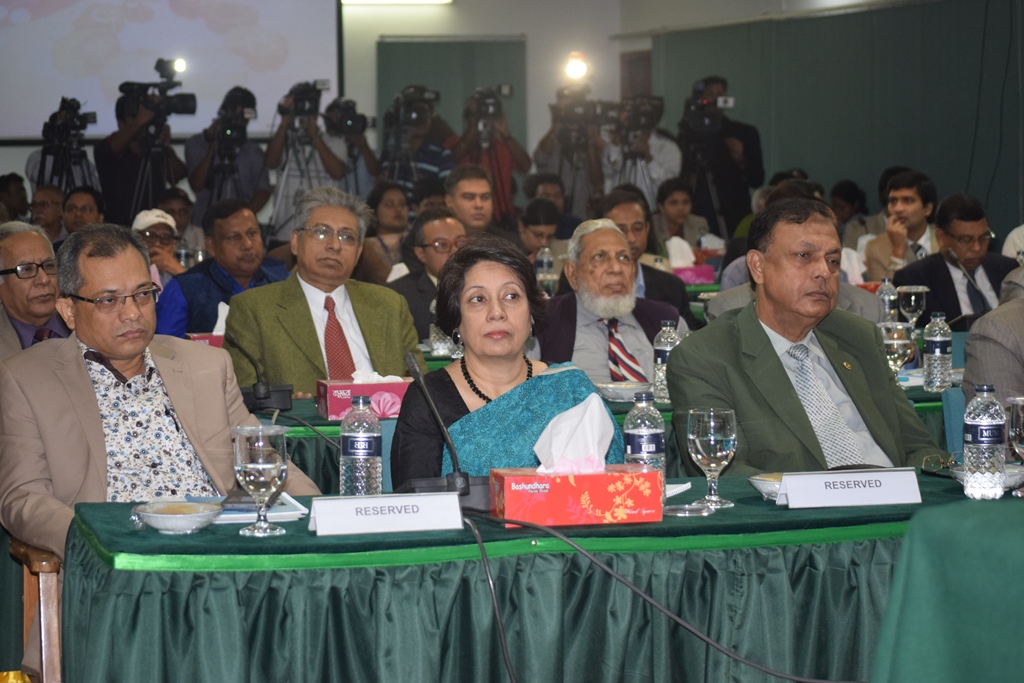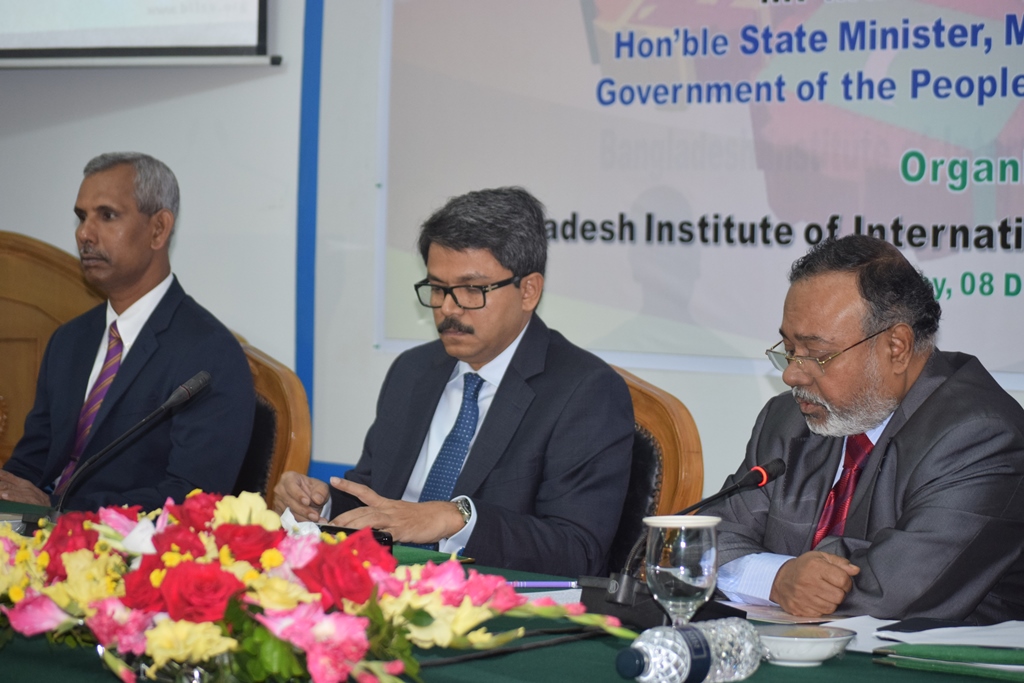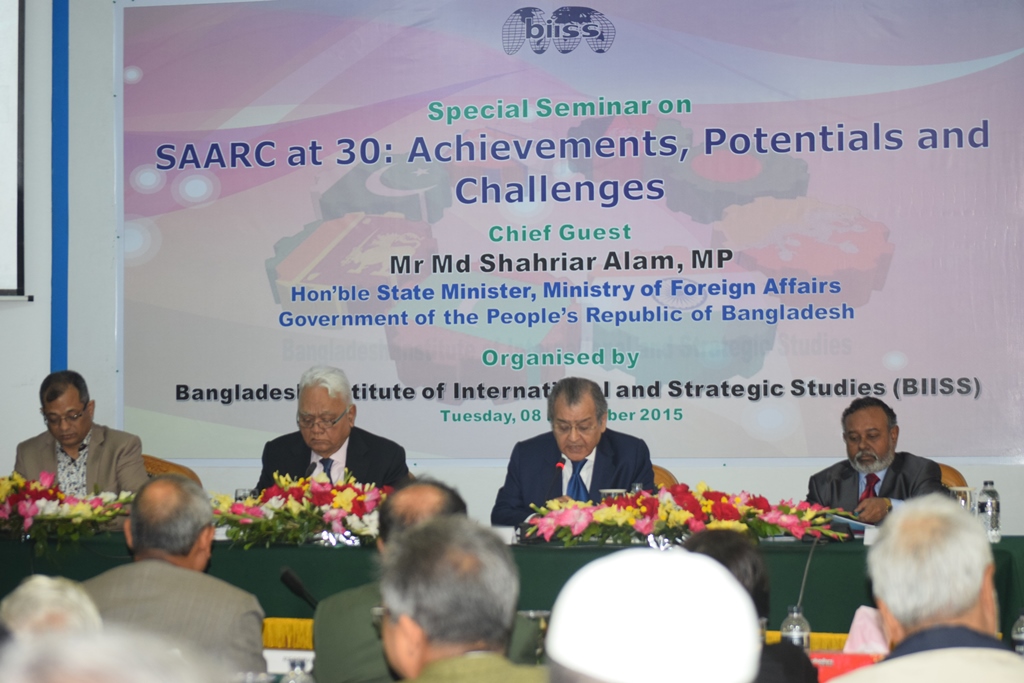Seminar on SAARC at 30: Achievements, Potentials and Challenges on 08 December 2015
DATE: 2015-12-08
Bangladesh Institute of International and Strategic Studies (BIISS) organised a seminar on 8 December 2015 to commemorate the 30th anniversary of SAARC titled “SAARC at 30: Achievements, Potentials and Challenges” at its auditorium in Dhaka where Mr. Md. Shahriar Alam, MP, honourable State Minister, Ministry of Foreign Affairs, Government of Bangladesh was the Chief Guest at the Inaugural Session. He said “Our great leader, Father of the Nation Bangabandhu Sheikh Mujibur Rahman mooted the idea of regional cooperation in South Asia as early as 1972, which was eventually materialised institutionally in 1985, when SAARC was established”. Mr. Alam noted that the present Government of Bangladesh under the leadership of Honourable Prime Minister Sheikh Hasina has put special emphasis on promoting regional cooperation after assuming office for the second consecutive term in January 2014.
Major General A K M Abdur Rahman, ndc, psc, Director General, BIISS delivered the address of welcome. He was optimistic about SAARC’s future and strongly believes that members of SAARC, sooner or later, will overcome the weaknesses, and work on the region’s commonalities and strengths to make inroads for shared prosperity and transform SAARC into a successful organisation.
Ambassador Munshi Faiz Ahmad, Chairman of the Board of Governors of BIISS chaired the Inaugural Session. He stated that SAARC countries have vast potentials. It is a huge market of about 1.7 billion people, has a considerable and fast growing middle class, thanks to sustained above average economic growth over many years, substantial reserves of natural resources, large coastline and geographical proximity with some of the biggest economies of the globe. He added that world powers are showing increasing interest in this region.
Ambassador Farooq Sobhan, President, Bangladesh Enterprise Institute chaired the working session of the seminar. He stated that South Asia is one of the regions that is most affected by global climate change and environmental insecurity. These are the two areas where SAARC countries can strengthen their cooperation together. Mr. Sobhan noted – “we have achieved something which we can build on, but lots of hard works are needed to be done in the years ahead.”.
Three presentations were made in the seminar. Mr. Syed Manzur Elahi, Chairman of Apex Footwear Ltd. made a presentation on “Trade, Investment and Economic Cooperation”. In the beginning of his presentation he discussed several initiatives undertaken by SAARC in order to increase trade, investment and economic cooperation in South Asia. Mr. Elahi suggested several points to make SAARC effective for example simplifying investment procedure e.g. simplification of procedures to apply for investment and approval process, simplification of cross-border customs regulations, dissemination of information on investment related rules and regulations among the member countries, developing harmonised manual of guidelines for investment in specific sectors within regional countries, etc. He stated that strategies should be thought of to go beyond FTA, into Comprehensive Economic Partnership Agreement (CEPA) and further down to set up SAARC customs union, common currency, towards economic union. For that all, political support at the top is must and implementation-al difficulties are to be addressed.
Professor Dr. Delwar Hossain, Department of International Relations of Dhaka University made a presentation on “Developmental and Social Perspectives”. He had a brief discussion on SAARC Social Charter, SAARC Charter of Democracy, declarations of SAARC decades and years, various agreements and conventions, SAARC Development Fund and non-state process of SAARC basically civil society engagement in SAARC. By discussing the issues, he showed changes in performance of social sectors in South Asia. Mr. Delwar pointed out some major challenges for SAARC that include: institutional limitations, narrow focus in action agenda, political divergence and confrontational relationships, absence of civil society, conflict of visions, problem with regional leadership, weak secretariat, and managing overlapping multilateral cooperation processes. He noted that amending SAARC Social Charter, and strengthening SAARC Secretariat are essential requirements to have strong social policy by SAARC.
Ambassador Munshi Faiz Ahmad, Chairman of the Board of Governors of BIISS made a presentation on “Inter-State Relations and South Asian Regionalism”. He stated that there are some regional groups e.g. the EU, ASEAN etc. who have succeeded in spite of difficulties in inter-state/bilateral relations. Marshall Plan (of the EU), having a common goal and cooperation are some of the factors helped the groups to be successful. These are the lessons SAARC could take into consideration for its advancement. Ambassador Ahmad further pointed out that SAARC can better move forward if the largest country and dominant power of South Asia, India, with great leadership takes it beneficial for its development. He added that leadership does not come with one way benefit, it comes with responsibilities. And with this leadership, all the countries must flourish, prosper and develop together and hope to have real good progress in South Asian regional cooperation.
Officials from different ministries of Bangladesh Government, representatives of different international and national organisations, former ambassadors, representatives of different embassies, eminent persons of different civil and military institutions, media and specialised academia participated in the open discussion and raised their valuable opinions, observations, questions and suggestions to the seminar. Some of the participants mentioned the shortcomings of achieving goals of SAARC and recommended to take lesson from past. They also noted that there is a need for extending unconditional and reciprocal cooperation by member states to eradicate poverty through trade and investment, greater market access and free movement of goods as well as people across the region. Some participants also appreciated the achievements SAARC had made so far (such as in meteorological study) and stressed on necessity for building a strong, prosperous and cohesive South Asia.

